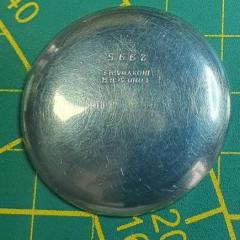My Watchmaker uses only one oil !!!
-
Recently Browsing
- No registered users viewing this page.
-
Topics
-
Posts
-
By nevenbekriev · Posted
I would repeat what @nickelsilver says, and even more. I have at leas 10 old thread plates and I have never seen one that will cut like a normal die. I don't know if they are completely worn or have never been sharp enough, but I find them completely useless. And, for the new Indian ones, I have heard only bad things. For sure, if one tries to cut more thread on a winding stem, this hole of the plate is ruined. Further more, I have bad experience with all watch size thread dies that I could buy from the available machine tool shops here. They could not cut normal thread even on brass rod. The size was significantly smaller and the pitch is like it should be for the claimed size... The thread shape was bad too. I will explain how I do threads. I use lathe that can cut threads and thus I can prepare perfect taps. I use milling attachment instead cutter in the tool post and so I can cut thread even on hardened rod. But I prefer to harden the rod after thread cutting and temper it only to light color change as to have the maximum hardness. Then I make a tap out of it by grinding. I prepare my dies for screw thread cutting with the taps I have prepared as described. In watchmaking, dies exist and are often used that are not cutting, but rather forming the thread. They are like nuts and don't have cutting holes and edges. This kind of dies I prepare and use. You will need soft steel plate , drill a hole in it, then cut thread, then make chamfer on one side, repeat the thread, harden. You can temper just a little or leave untempered, depending of the steel You use. Using such die is with soft steel rod (or completely annealed). Good oil is to be generously applied. The rod has to be with smaller diam than the thread size (about 0.8 - 0.9 x ), the diam is better determined by tries. The rod elongates by the thread forming too. When I have to make screws from harder material like SS, I just cut them on the lathe. You screw needs hardening and tempering to be finished as real screw. -
You could make a guide/jig. Cut a slot in a piece of metal approx the same thickness as the screw head, then drill a hole (screw head diameter) in that slot.
-
By darkhelmetlive · Posted
Tried a SR920W and its completely dead after 3 weeks 🤷♂️ -
By Tigermuffins · Posted
Thanks so much for quick replies. I got some watch repair tools ordered, and will get back with pictures once I removed the back lid and get into it 🙂
-






Recommended Posts
Join the conversation
You can post now and register later. If you have an account, sign in now to post with your account.
Note: Your post will require moderator approval before it will be visible.